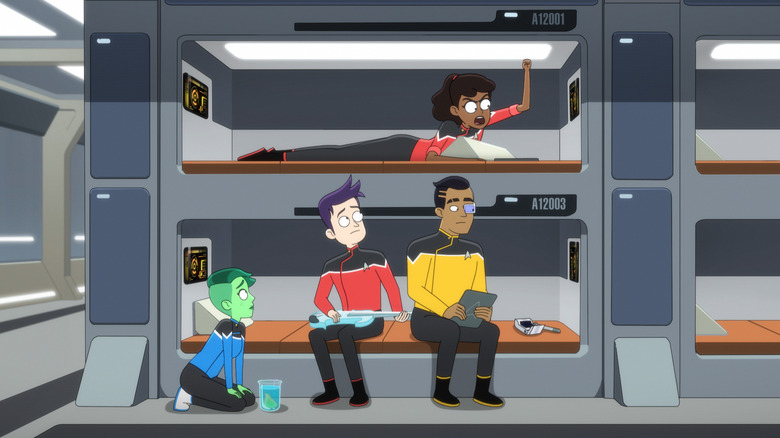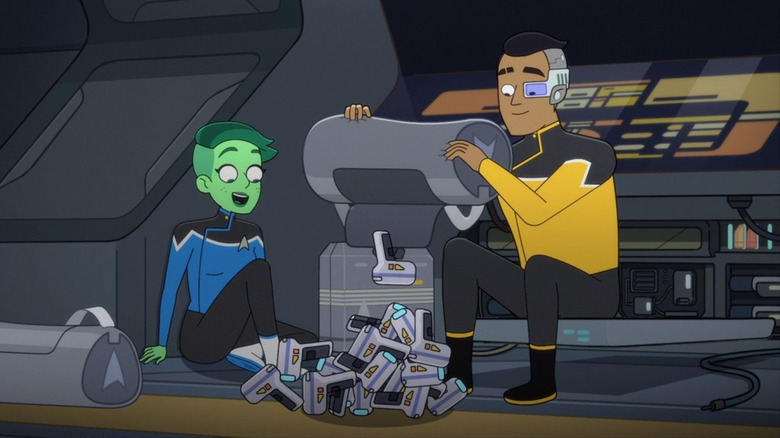Star Trek: Lower Decks Season 3 Showcases Just How Annoying Living On A Starfleet Vessel Would Be
Prior to "Star Trek: Lower Decks," the experiences of lower-ranking Starfleet officers were largely placed in the hands of the notoriously goody-goody character of Wesley Crusher (Wil Wheaton) on "Star Trek: The Next Generation." Wesley was exceptionally bright, and despite having lost his father in the service, dreams of joining Starfleet himself. He is supernaturally motivated, and is constantly seen studying, reading, and conducting scientific experiments in his spare time. He is also obnoxiously squeaky clean, once notoriously asking Lt. Yar (Denise Crosby) why anyone would ever want to do drugs. Wesley is, in short, a narc.
Wesley would eventually make some pretty rash mistakes at Starfleet Academy, and end up leaving the service to galavant about the galaxy as a semi-supernatural energy being. But Starfleet was presented as — as Wesley seemed to feel — the ultimate goal of a youth well spent. It was the best possible career. Begin as an ensign, and take care of a starship doing important tasks around the Alpha Quadrant, and live a great life.
Until "Star Trek: Lower Decks."
"Lower Decks," falling in with the tradition of "Star Trek" as a series of workplace shows, reveals that not all starships are terribly important, and not all jobs on a Starfleet vessel are all that dazzling. Indeed, the running gag of "Lower Decks" is that a lot of what Starfleet does is kind of tedious, sometimes painful, often stressful, and can definitely be less than dignified. Case in point: The ensigns aboard the U.S.S. Cerritos don't even have their own quarters. They sleep on bunks in a hallway. There is a public shower and no dressing rooms. Privacy is a thing of the past, it seems.
It's a living
A lot of dialogue on "Lower Decks" is devoted to annoyed repetitions of "Starfleet ideals." Ensigns Boimler, Mariner, Tendi, and Rutherford (Jack Quaid, Tawny Newsome, Noël Wells, and Eugene Cordero) often have to remind themselves that there is indeed a larger ethos at work while they empty trash cans and are ignored by their superiors. Working as an ensign on the Cerritos and calling yourself an important piece of the Federation is like working as a broom jockey in a movie theater and claiming to be an important part of Hollywood.
Starfleet, like any job, has its crappy corners. An early episode of "Lower Decks" — "Cupid's Errant Arrow" (September 3, 2020) saw Tendi and Rutherford envying the superior pieces of hardware aboard a rival vessel. They ended up secretly stealing a box of widgets called T-88s and bringing them back to their own ship. This smacks all too familiarly of instances in retail jobs where one races their co-workers to the broom closet to get "the good broom."
When living on a vessel, cramped together with co-workers you may not like, the submarine-like existence of a Starfleet ensign makes itself all too clear. In the latest episode — "Room for Growth" — it is revealed that private quarters can be made available to ensigns, but only through an oblique lottery system. Only a few ensigns will be allowed to live in a room with a door on it. Additionally, this is such a coveted prize, that a complex system of cheating has already been put into place, and the central Lower Deckers will have to race their rivals through the ships labyrinthine ductwork to access a certain computer server.
The job sucks
There is currently a budding romance on "Lower Decks" between Ensign Mariner and Ensign Jennifer Sh'reyan (Lauren Lapkus). While it's been sweet to see the two ordinarily proud and tough characters gradually admit their feelings, one can't help but sense an oncoming cautionary tale about dating co-workers. The rules of officer fraternization are a little hazy throughout "Star Trek," and while not expressly forbidden, one gets the impression that dating fellow officers is seen as, at the very least, unprofessional.
The U.S.S. Cerritos hasn't stated its crew complement, but, given its size, it certainly contains a lot fewer than the Enterprise-D (which housed over 1,000 people). If this author were to hazard a guess, he would put the complement in the 250 to 300 range. Small enough, at any rate, to worry about bumping into an ex-partner in the hallways. When going away to college, one might be told not to date someone on their own dorm floor. The same advice might be prudent on the Cerritos. With no privacy, there's nowhere to flee to. There's work, and there's sleep in a hallway, there's awkward social dynamics that will always be aggressively in play. It's like a badly laid out dorm where you have little agency, have to follow orders, and need to look at your peers naked.
But then, all of these discomforts are part of what make "Lower Decks" so appealing. Not only will modern retail workers take comfort in the fact that even Starfleet has low-rent grunts, but deep-cut Trekkies may enjoy the exploration of a Starfleet vessel beyond the bridge, main engineering, and sickbay. Not everything is romantic and cerebrally intense on a Starfleet vessel. Sometimes, in a very relatable way, the job sucks.


